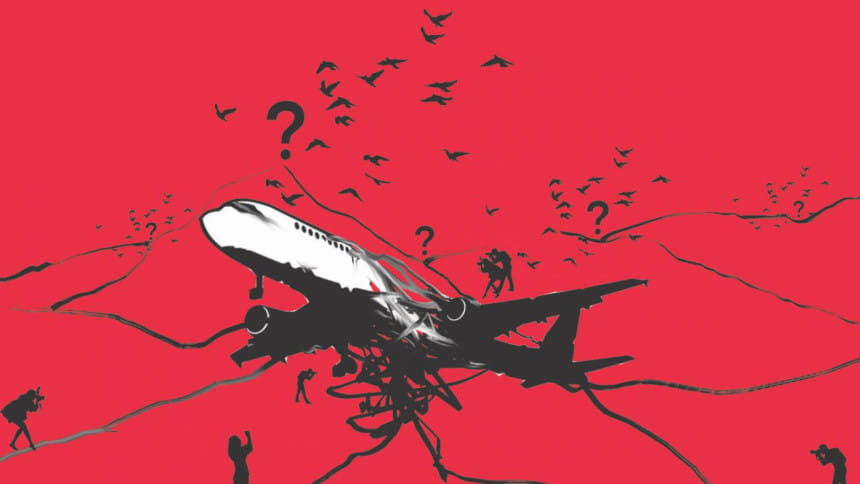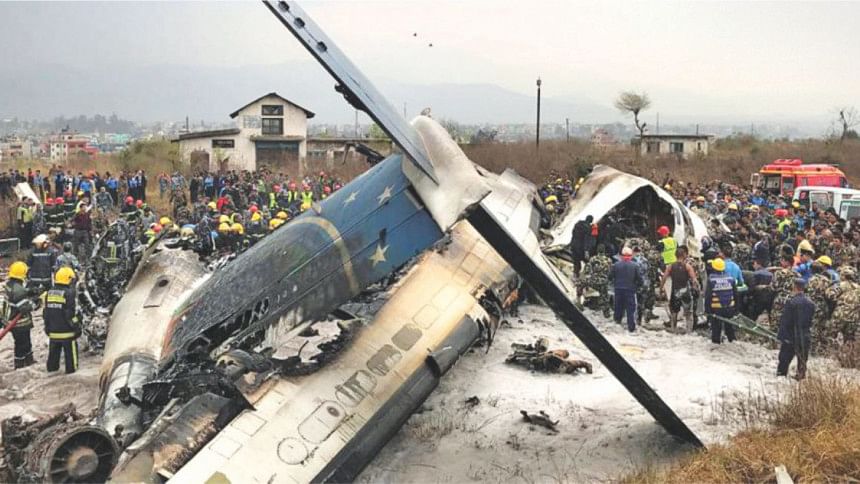Reporting Trauma Empathy Not Sympathy

The recent BS211 crash went down as one of the gravest chapters in Bangladesh's aviation history. But before the dust had settled and the survivors had a chance to process their grief, rampant media speculation turned the spotlight to the conduct of the newsmen themselves.
In the rush for breaking the news first and gaining the most target rating point, a few journalists were all too eager to cross industry-accepted boundaries. While everyone was busy piecing together what had happened, some in the media took it upon themselves to be the judge, juror and executioner.
As an unspoken rule, newsmen don't generally go about questioning each other's methods. However, at times, you need to throw away the rulebook and take a good long look in the mirror. Especially when it is a small contingent of professionals that give everyone else a bad name.
The same journalists who use their profession to court privilege (why will I be stopped at a check post?), were the ones making a mockery of the respectability that comes with the job. Maybe they were not trained or maybe they had become too desensitised. For them, perhaps this is the perfect time for quiet reflection and going through helpful material.
The Dart Center for Journalism and Trauma is a great resource for understanding the how-to's when it comes to interviewing or engaging with victims of trauma. The steps themselves are simple enough but their practice was not evident, at least this time around.
A matter of consent
Informed consent is one of the first rules when it comes to such interviews. The victim has the right to know exactly what content is to be published, images to be used and how it is going to be gone about.
However, in Kathmandu, there were two incidents when journalists barged into the Intensive Care Unit (ICU) of hospitals and began peppering the survivors with questions. Once, a journalist even identified himself as a well-wisher, just to get an interview. In the process of the interview, he did not mention who he was to the victim and asked a number of insensitive questions.
What did you ask?
Which brings us to the next rule: the content of your questions. One journalist asked a survivor, who had just lost her loved ones, how she was feeling. It was not just an insensitive question but also a stupid one. A journalist should practice putting themselves in the place of the victim. This is the delicate approach. It may be your job to collect facts but how you collect it should matter.
Another question which should have been avoided, is asking them to recount the entire crash. After coming off such a tragedy, reliving it repeatedly for the delight of cameras and paper pushers must be a harrowing one. Though an unethical journalist may salivate at the prospect of having some breakdown mid-interview and while the audience may too enjoy the show, this doesn't make it a logical decision.
Media may be a business but every business is governed by its set of ethics. Some things just cannot be justified and manipulating the victims of any tragedy falls under that category.

News subjects are people too
Then there's understanding the grief. After experiencing a tragic event, those associated with it are in a vulnerable state of mind. They may speak without thinking and their decision-making, especially when it comes to their own well-being, may be compromised.
In an infuriating instance, as the relatives of victims waited at the hospital to be updated on the bodies of their loved ones, a journalist from a renowned TV channel took a disturbing approach to her job. She went up to the relatives and informed them that the Bangladeshi aviation minister had said the relatives were not even in Nepal and those who were did not want the bodies.
This was a day after the crash and some of the relatives did not even know the fates of their loved ones. They were highly charged; upon hearing these words, they began fuming. The journalist then "helpfully" informed them that the minister was on his way and they should charge him. The relatives then gathered together to stop the minister and question him.
Done with her dirty deed, the journalist then went up to her cameraman and said, "Turn it on. Something is about to happen."
The fact is the minister made no such remark. Incompetent as his handling of the entire affair was, this particular accusation was a lie. As the relatives prepared themselves for the confrontation, other journalists told them that they had been lied to. The relatives were shocked. One even came up to us and asked to be helped. "I cannot imagine she would exploit us like this." He was warned to be very careful about what he told some of the journalists.
The era of citizen journalists
Of course, professional journalists aren't the only problem. Citizen journalists, armed with their smart phone and Facebook followers, are as big a part of the problem as any other.
A few, eager for likes and shares, would share absolute nonsense stories. They too would barge into ICUs and conduct interviews under the pretense of "informing people back home".
If they didn't find a story, they would make one. Take the case of, The Daughter of Bangladesh. A concept borne from misogyny, the female co-pilot of the plane was said to have saved 10 lives. This was perhaps intended to deflect attention from her gender and her role as the co-pilot, a matter of much debate.
Asking anyone would kill the rumour, but it was picked up and circulated nonetheless.
Why? Because some citizen journalist believed this was a good story.
Things took a more serious turn when rumours started popping up on social media that Captain Abid Sultan's wife is dead, following in the footsteps of her husband. At the time of filing this report, she was still battling valiantly for her life in the ICU upon suffering multiple strokes after her husband's death. A lack of verification however did not deter online news portals and social media influencers from making the "news" go viral.
In 2018, citizen journalism is a growing trend. But one needs to take with a grain of salt whatever is found on social media.
The audience too has a role to play and as long as pity porn sells, some will produce it. There are indeed big markets that fetishise tragedies and in a capitalist world, what is demanded will be supplied.
In Kathmandu, much like anywhere else, it takes one bad apple to spoil the rest. Journalists can no longer rest on their laurels. Audiences must also be wary of what they consume and what they want to consume. It is time for us to really reflect on our own ways and put ourselves under the scrutiny of our very pens.
We need people to tell us their stories. We need people to trust us enough to do so. And in return we expect our stories to get people moving. Journalists will not change the world. The people will. In this pursuit, we must all curb our enthusiasm for that which cannot be morally justified.

 For all latest news, follow The Daily Star's Google News channel.
For all latest news, follow The Daily Star's Google News channel. 




Comments